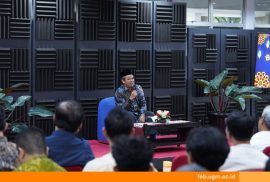Until now, waste is still a severe problem for the world community, including Indonesia. The government has also promoted the idea of a circular economy to solve this waste problem. UGM Faculty of Economics and Business (FEB) lecturer and circular economy expert, Luluk Lusiantoro, S.E., M.Sc., PhD, emphasized the importance of changing the perspective or mindset of all parties in managing waste, both by the community as consumers and business people or company as a manufacturer. According to him, understanding the waste problem is not just about waste management but the system as a whole.
“So when discussing waste, it must be seen from a systems perspective. “It’s not just about waste on the streets and landfills, but how it is managed and the output, if it is managed, leaves no more waste behind,” he explained Thursday (21/3) at the FEB UGM Campus. Luluk said that a circular economy means that waste produced from consumption goes back into production so that no waste is produced. A circular economy can be started by sorting 3R waste (reduce, reuse, recycle) from its source, whether the waste is made at the household level or public facilities by consumers or companies as producers.
“If you want it to be managed well, you have to sort waste from the source; that’s the basics,” he said. However, the behaviour of sorting waste still needs to be solved. He gave an example: Not a few households know about sorting waste. This condition occurs because no incentive system exists for perpetrators who succeed in sorting waste. Likewise, many companies, industries, and public facilities still need to segregate waste and hand it to partners to process it.
For this reason, Luluk views that apart from promoting education about waste sorting, there is a need to provide incentives to encourage changes in waste sorting behaviour both at the household and industrial levels. In the future, it is hoped that final disposal sites (TPA) will no longer be an option for the community. One good practice of incentivizing individuals or households who sort waste is done in Panggungharjo Village, Sewon, Bantul, and DIY.
“Households that sort waste will be given incentives by waste managers. Waste with sales value will be counted, and incentives will be given later. “The result can be to cut the payment of waste fees, whereas, for those who don’t want to sort waste in this condition, the payment of waste fees will automatically be more expensive,” he explained. Luluk said that waste collection officers also need to be educated. Until now, many people have still applied the practice of mixing back the waste sorted from the source while in the waste collection vehicle. This led to the re-sorting process at TPS 3R.
“The flow is from a circular economy or supply chain perspective, from a systems perspective, not just waste management. However, if a business produces waste, the product produced is the responsibility of consumers and the company that produces it. “Producers are responsible for the waste produced even after it is consumed by consumers and returned to the production system,” explained this lecturer at the Department of Management, FEB UGM.
Lulu explained that these steps are undoubtedly challenging. In his view, good infrastructure needs to be developed to handle waste products so that they can run efficiently. He gave an example of a circular economy that can be done by creating products from waste that can then be reused. Another example is practising the concept of mindful consumption, namely, thinking consciously about the consequences of consumption. Put this concept into practice by looking at the urgency of a product, whether it is a need or just a desire. Even though it is not easy, people should be able to apply the concept of mindful consumption. The reason is that excessive consumption will deplete resources, which will result in the increasingly depleting availability of existing natural resources.
“There must be awareness among consumers so that consumption can be limited to what is needed,” added the man who initiated the circular economy education platform ekonomisirkular.id. When consumers implement mindful consumption, it will impact the broader economy. Therefore, the business model run by the company can also adjust. From a business perspective, business actors or producers are expected to be able to change their business models. For example, a business model run on the principle of ownership was changed to rental. For instance, carpentry tools in the household that are only used occasionally and stored more often produce waste. Meanwhile, with the rental business model, product ownership will be attached to the company so that when the rental period expires, it will return to the company to be rented out or even recycled. Companies are expected to be able to take advantage of the opportunities from this circular economy paradigm.
Luluk added that the government and NGOs also have a crucial role in supporting the country’s implementation of a circular economy. According to him, there needs to be a policy or regulation designed to encourage this practice in society. Currently, in Indonesia, there is no binding policy, only an appeal regarding the implementation of a circular economy as an effort to overcome the waste problem. “There must be a design for this. For example, the government requires that when running a business, there must be good waste management standards accompanied by continuous reporting. “The implementation of this circular economy can start from large-scale companies,” he said.
Luluk further said that the design developed must be massive. The government needs to provide education regarding the circular economy in society. This can be done from an early age, starting at the elementary school level, for example, by developing a particular lesson about the circular economy to influence how society thinks. “You have to start changing consumption behaviour so that it will be faster to change to a more circular economic system,” he concluded.
Reportage: Kurnia Ekaptiningrum
Photo: freepik.com












